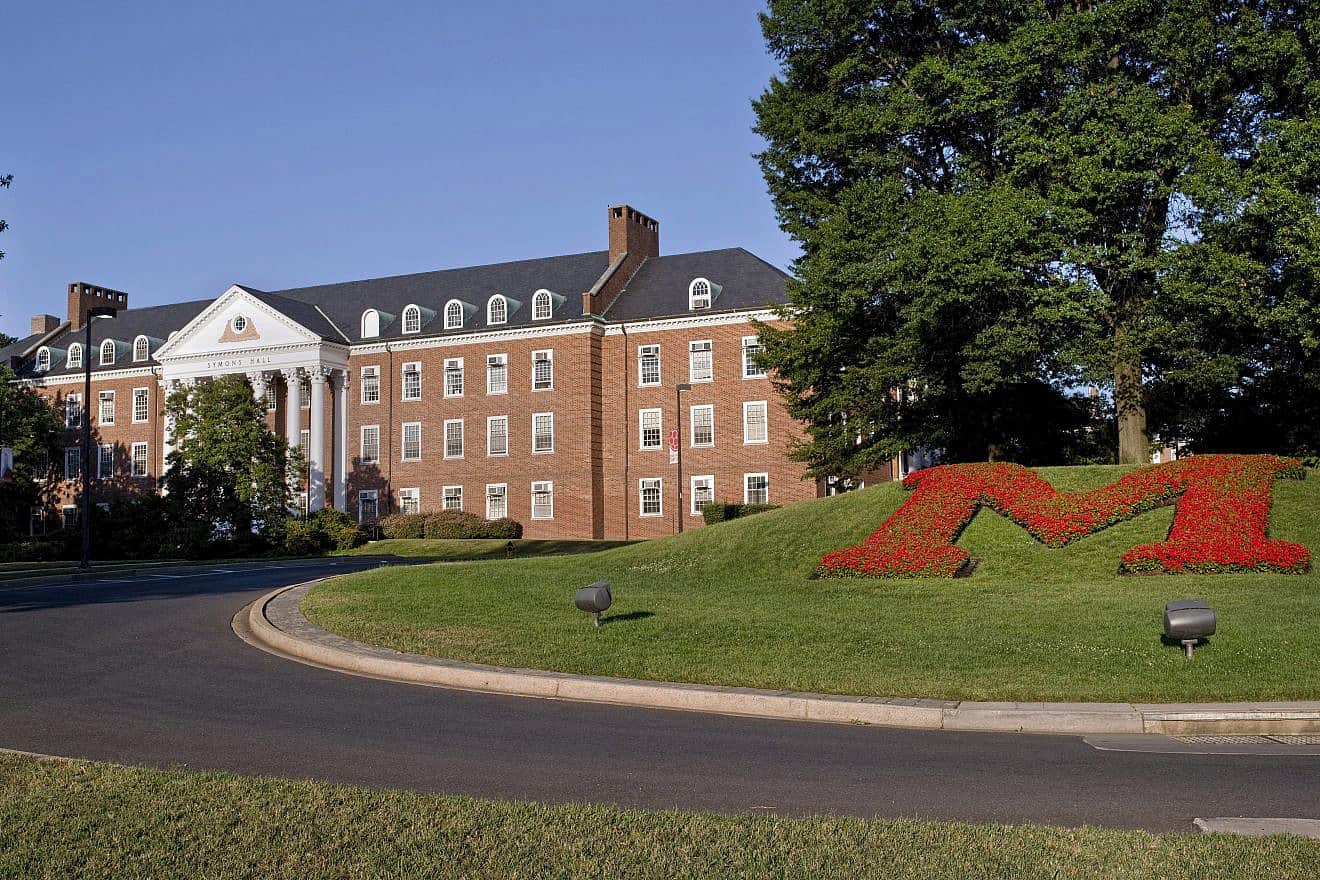National discussions about campus antisemitism since the Oct. 7 terrorist attacks by Hamas in Israel have largely overlooked one of the nation’s largest Jewish student populations: the University of Maryland, College Park.
The 1,340-acre campus, some 10 miles northeast of the National Mall, which has drawn major gatherings both in favor of and against the Jewish state, is home to about 5,800 Jewish undergraduate Terps—19% of the undergrad population—and 800 Jewish graduate students. That makes the more than 165-year-old institution the fourth-largest public university in terms of Jewish population, according to Hillel International. The Orthodox Union adds that the school has one of the nation’s largest Orthodox communities as well.
JNS spoke with more than a dozen Jewish Terps, including undergraduate and graduate students, and a recent graduate, along with the Hillel’s executive director and an associate dean at the business school. Students described the campus as welcoming and apolitical in normal times. That was until Oct. 7.
Since then, the campus has seen anti-Israel and antisemitic rallies and messages chalked in central locations. Jewish Terps believe things are considerably worse at other schools, but the atmosphere in College Park, Md., has undoubtedly changed.
Faculty factor
Students don’t think professors in College Park—like those openly calling for violence against Jews and Israel at other places—are the primary drivers of the shift on campus. But they do play a role, according to Gilad Chen, associate dean for research and chair in organizational behavior at the Robert H. Smith School of Business.
For instance, a message from faculty in the women, gender and sexuality studies department—“completely false and antisemitic in nature”—was only removed following a complaint to a dean, Chen told JNS.
Letters from the American Studies Association and National Women’s Studies Association calling Israel an “apartheid” state remain on the department’s website. And the Oct. 13 NWSA letter claims that “decades of illegal Israeli military occupation and systemic violent campaigns in the West Bank and Gaza Strip” are context to the “current escalation.”
Professors have published dueling open letters in The Diamondback, the main student paper. (Chen signed the one in support of Israel.) Still, students told JNS that their professors have not shared personal opinions about the war in class.
When pro-Israel students have sought extensions due to stress following the terror attacks in Israel and its war against Hamas, Eitan Linsider has “only seen teachers responding positively,” the junior and computer science major from Atlanta told JNS.
Naomi Grant, a recent alumna and president of the Jewish Terps Alumni Network, told JNS that at least one student had a less accommodating experience.
A professor gave the student permission to skip class to attend the “March for Israel” rally on Nov. 14, which drew about 300,000 people to the National Mall in nearby Washington, D.C., but the teaching assistant wouldn’t let him go. That TA also canceled office hours “for a Palestinian rally,” Grant told JNS.
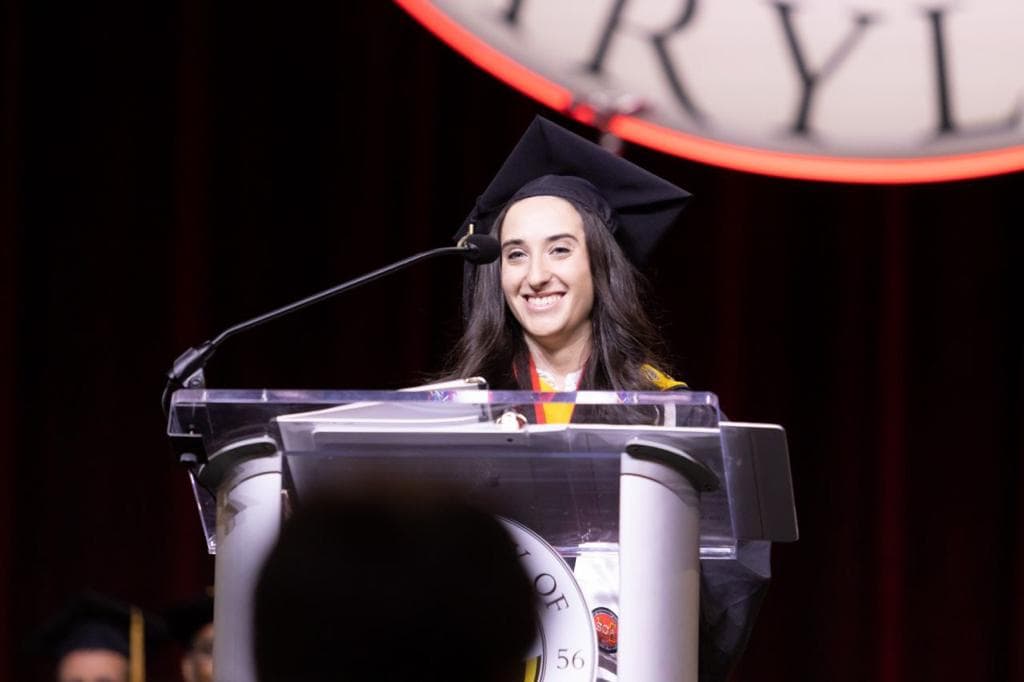
Losing friends
Keren Binyamin, a graduate business student from Columbia, Md., co-authored a petition to university administrators seeking “concrete steps” to combat antisemitism.
Asked if she has lost friends since Oct. 7, Binyamin replied: “Who hasn’t?” She said she has tried to engage politely on social media with childhood friends. “I say something they don’t like, and they stop talking or block [me],” she said.
Natalie Davis, a senior and journalism major from Hartford County, Md., interned for an Israeli paper over the summer. She saw a picture of a now former friend at a Students for Justice in Palestine (SJP) rally. “There wasn’t an official conversation, but we view the conflict differently,” she told JNS. “That destroyed the friendship.”
An Orthodox senior who did not want to be named told JNS that he was shocked to see anti-Israel messages on the Instagram pages of several colleagues from the campus radio station, WMUC, beginning on Oct. 8—the day after Hamas’s brutal attacks. One of those said “Israel should be dismantled, and all Jews should have to move to America,” reported the student, who stopped attending radio station meetings for several weeks. “It was shocking.”
When students chalked “Holocaust 2.0” during an SJP event on Nov. 9, the student wrote on social media that the message was unacceptable and trivialized the Holocaust, even if it wasn’t calling for another genocide against Jews. Someone from the radio station “accused me of being manipulative and spreading lies,” the student said. He unfriended people on social media as a result.
Campus safety
Several students told JNS they are glad that the university’s police department has increased security at Jewish institutions and campus events since Oct. 7.
Of 37 reported instances of bias on campus in October, eight were related to religion, and in November, 19 of 46 such reports were faith-related, according to Hafsa Siddiqi, the university’s media relations manager. Citing “privacy concerns,” Siddiqi declined to say how many involved Jewish students.
November’s total “is the highest number of reports we’ve received in a single month thus far,” she told JNS.
Chen told JNS that on homecoming weekend, Jewish parents wearing yarmulkes were yelled at and called “dirty Jew.” He has also heard that students who put up Israeli flags outside dorm rooms found signs placed on their doors and were shouted at, identified as Jews and told to go home.
Ari Israel, a rabbi and executive director of the campus Hillel, assured JNS that “students feel physically safe on campus.” He allowed that there is “rhetoric and anxiety around some of the public rallies against Israel—anxiety that is caused by people chanting things.”
“At times, students are uncomfortable,” he said.
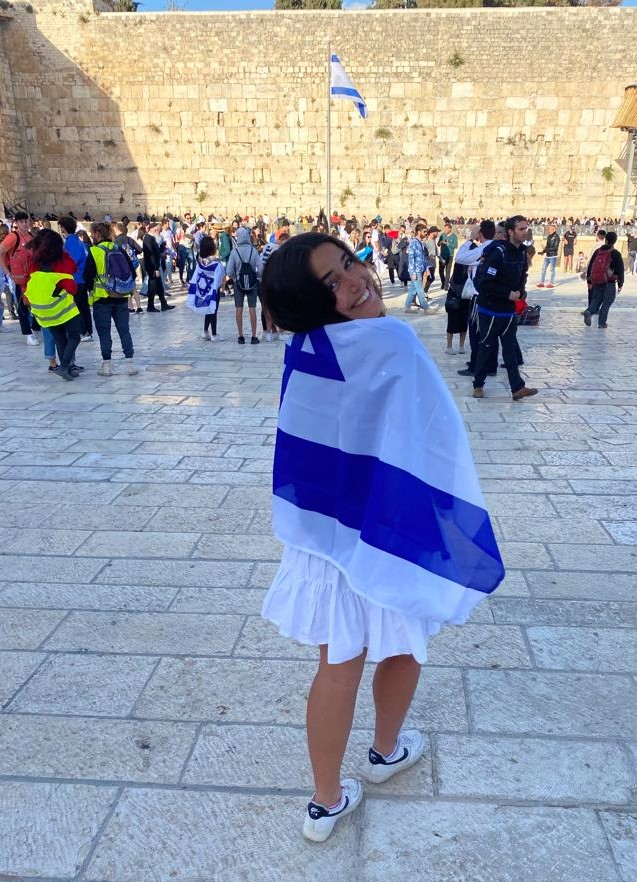
Students repeatedly cited Students for Justice in Palestine rallies as an example of what has changed the campus atmosphere. “The SJP chapter used to be small but loud and no one was really involved,” Binyamin said. “Now their events get hundreds of people.”
She has attended three of the group’s events “to document it for personal interest,” including a “chilling” moment when a student announced on a megaphone: “No more games. There is only one solution. Intifada revolution.”
“It was reminiscent of the Final Solution,” Binyamin said.
The anti-Israel student group, which didn’t use to talk about the pro-Israel community on campus at its events, now refers to “the Zionists,” according to Binyamin. Jewish students had to walk by chalked messages on campus containing obscenities about Israel, “from the river to the sea” and mentions of “intifada,” she added.
Lia Dolev, a sophomore from the Philadelphia suburbs majoring in government and politics, told JNS about staffing a table at Terps for Israel’s “Day of Kindness,” held the same day as SJP’s first campus rally last fall. (Maryland Hillel co-sponsored the event.)
A student approached student group members at the table—including Dolev, the group’s political chair—and accused them of supporting Nazis and told them to kill themselves. “That was the only time I felt a little distraught,” she said.
SJP members came over to condemn what the student uttered, but “that doesn’t take away from the fact a student on campus said that,” stated Dolev, whose father is Israeli and whose maternal great-grandparents are Holocaust survivors.
Several students also told JNS that a Jewish Voice for Peace chapter was established after Oct. 7. That and other anti-Israel Jewish groups “played a significant role in attacks on Jewish identity,” per a 2022 report from the AMCHA Initiative, which found that the presence of JVP or a similar group more than doubled “the likelihood that a campus will play host to incidents involving the redefinition or denigration of Jewish identity.”
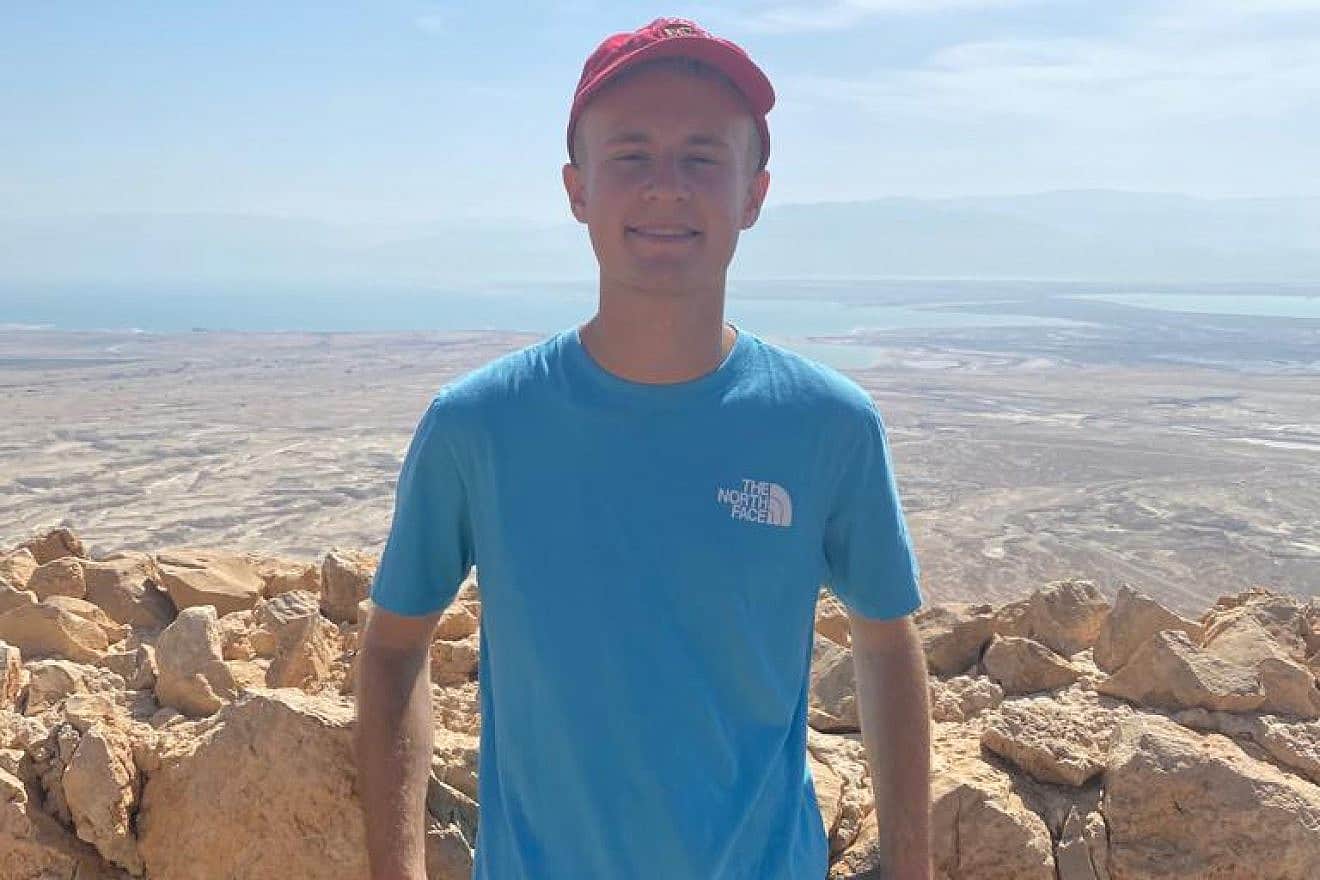
Noah Jerushalmy, a junior from Edison, N.J., and campus liaison to AIPAC, still walks around with his yarmulke. “I am very against the idea of living in fear. That’s exactly what the enemy wants,” he told JNS. “I haven’t gotten any issues about it.”
On campus, he said, “the majority is anti-Hamas. The minority is anti-Israel.”
Linsider, the junior from Atlanta, also wears a yarmulke and has attached an Israeli flag and flag pins to his backpack. He thinks that administrators want to improve campus life for Jewish students but “mentally, you feel unsafe walking around campus sometimes.”
“Sometimes, in private, people talk about how difficult it is and mentally straining to do well in classes,” Linsider told JNS.
“But walking into Hillel, everybody—all the Jewish communities—are so closely working together, bonding together, through the trauma,” he said.
‘On edge’
Ayelette Halbfinger of Washington, D.C., who believes herself to be the first Orthodox Jewish student body president at a Big Ten school, told JNS she has been “more on edge” since Oct. 7 and is careful about what she calls up on her laptop screen during class, including the WhatsApp conversations in “Hebrish” and the Red Alert application, which sends alerts about rocket attacks on Israel. (Halbfinger graduated with a B.S. degree in May and spoke to JNS before her graduation in December with a second B.S. degree.)
Israeli students told her that they are nervous about calling their parents while walking on campus, fearing someone will recognize their Hebrew.
“A lot of us feel very high-strung and like we’re watching our backs a lot,” Moses Bakst, a senior from Brooklyn, told JNS.
The electrical engineering student generally feels safe physically on campus. “But there are places I just avoid now,” he said. Bakst sees the student newspaper and radio station as “hostile clubs,” and doesn’t feel safe at protests and rallies. “It just feels dangerous,” he said.
Binyamin wears skirts, a Magen David necklace and an Israel pin on her backpack. “Day to day walking to class, I don’t think your average University of Maryland student is going to say or do anything,” she said.
“I don’t think I’m at risk for random physical attacks. I don’t think that’s imminent, but I recognize the situation is escalating,” she added. “I see what happens elsewhere and don’t want this to get worse than it already has.”
Campus media
Students, who spoke anonymously, described extracurricular activities with the Diamondback and WMUC as hostile toward pro-Israel students, as did Bakst, a former copy editor at the paper.
Bakst told JNS that he quit the paper on Oct. 17 following several incidents and his own review of the paper’s archives over the past five years, which revealed to him a dearth of pro-Israel articles. An Oct. 12 article about a vigil that Jewish students organized for murdered Israelis cited criticism of the Jewish state from Al Jazeera and the United Nations, he noted.
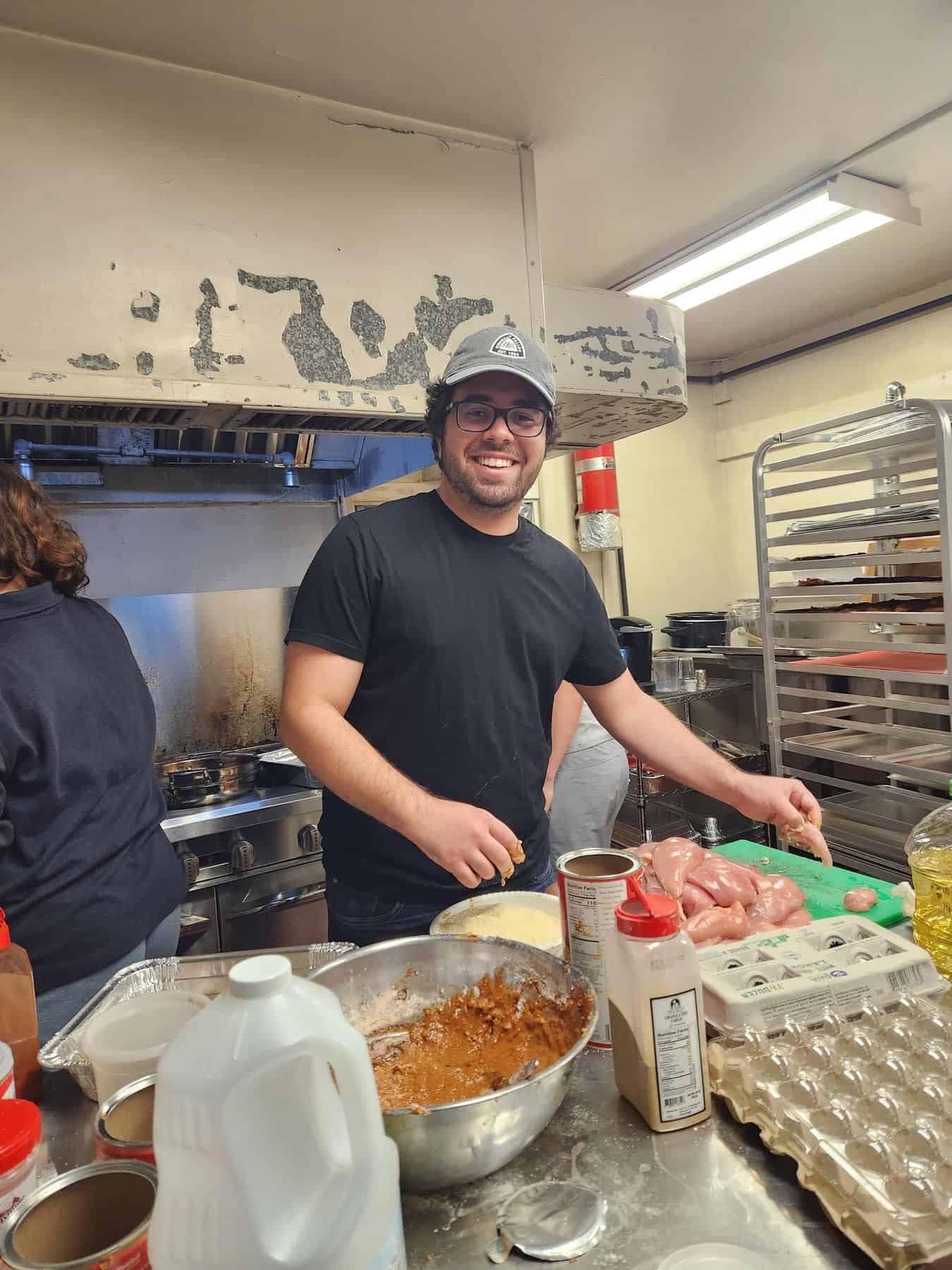
When Jewish students sought to publish a guest column in the Diamondback about how they viewed the vigil as apolitical mourning and sought empathy from the campus community, they felt the newspaper staff dawdled and made disagreeable edits, according to Bakst.
He told JNS that a colleague at the newspaper expressed disappointment that he would be copy-editing that column, and the editor-in-chief offered that someone else could edit it. He opted to do so himself.
There was “no hope for me being neutral and just doing my job,” he told JNS. “I’m now the pro-Israel voice in the room—definitely the only one.”
His edits didn’t make it into the final op-ed, which ran on Oct. 16, Bakst told JNS. He also said the paper “buried” it and didn’t post it on Instagram or in the newsletter.
Bakst also charged that the paper was “doing stenography” for Students for Justice in Palestine, as when an Oct. 17 article noted that “free Palestine” has “long been at the center of calls for Palestinian liberation.” It also cited an SJP member who said the phrase educates others about the “plight of the Palestinian people” and calls for them to be free “from the state of occupation that they have been under for 75 years.”
The piece also uses statistics from the Gaza Health Ministry without noting that it’s run by Hamas.
At WMUC, whose office is near the newspaper, the Orthodox senior (who has been part of the radio station and didn’t share his name) told JNS that the situation is no better. The student, who has been involved with the station for the last two-and-a-half years, first noticed “some antipathy toward Israel and Zionism” in April.
The station’s general manager wrote on a staff Slack channel that he reneged on his endorsement of a candidate for student government after finding the latter supported Israel. Radio staff then criticized Zionists on the channel, the student said.
“I was the only one who pushed back,” the student said. “I said this isn’t an appropriate place to talk about Israel and politics.”
In November, the radio station ran a 24-hour radiothon for Gaza, raising money for Palestinian charities. The student told JNS that he told colleagues that the station should raise funds for both pro-Israel and pro-Palestinian charities to remain neutral, and he presented a list of both.
“They disregarded my suggestions on Jewish and Israel charities; they only took my suggestions for Palestinian charities,” he said. He has since resigned from the station’s staff.
Mixed reviews
Students gave the university’s administration mixed reviews for its responses to campus antisemitism. Tzofia Leibtag, a sophomore studying psychology from Silver Spring, Md., told JNS that “the administration really has our back.”
Bakst praised the university’s restriction of chalking to certain parts of campus and enforcement of an existing “technical ban on bullhorns.” But he and others remain unhappy about the administration’s decision to create a joint antisemitism and Islamophobia task force rather than a stand-alone one on Jew-hatred.
“We called for a task force, but we specifically wanted one centered around Executive Order 13899,” Binyamin said. “This shows you don’t have a great understanding of either of those two hates if you think they can be conflated.” (Former President Donald Trump issued the executive order, “Combating Antisemitism,” in 2019.)
Halbfinger thinks that combining Jew-hatred and Islamophobia makes it “more of a performative task force.”
“If this task force is going to be effective, there have to be two different teams,” she said. “A team dealing with antisemitism must be comprised of Jewish stakeholders, respected experts on antisemitism and not just academic experts on antisemitism.”
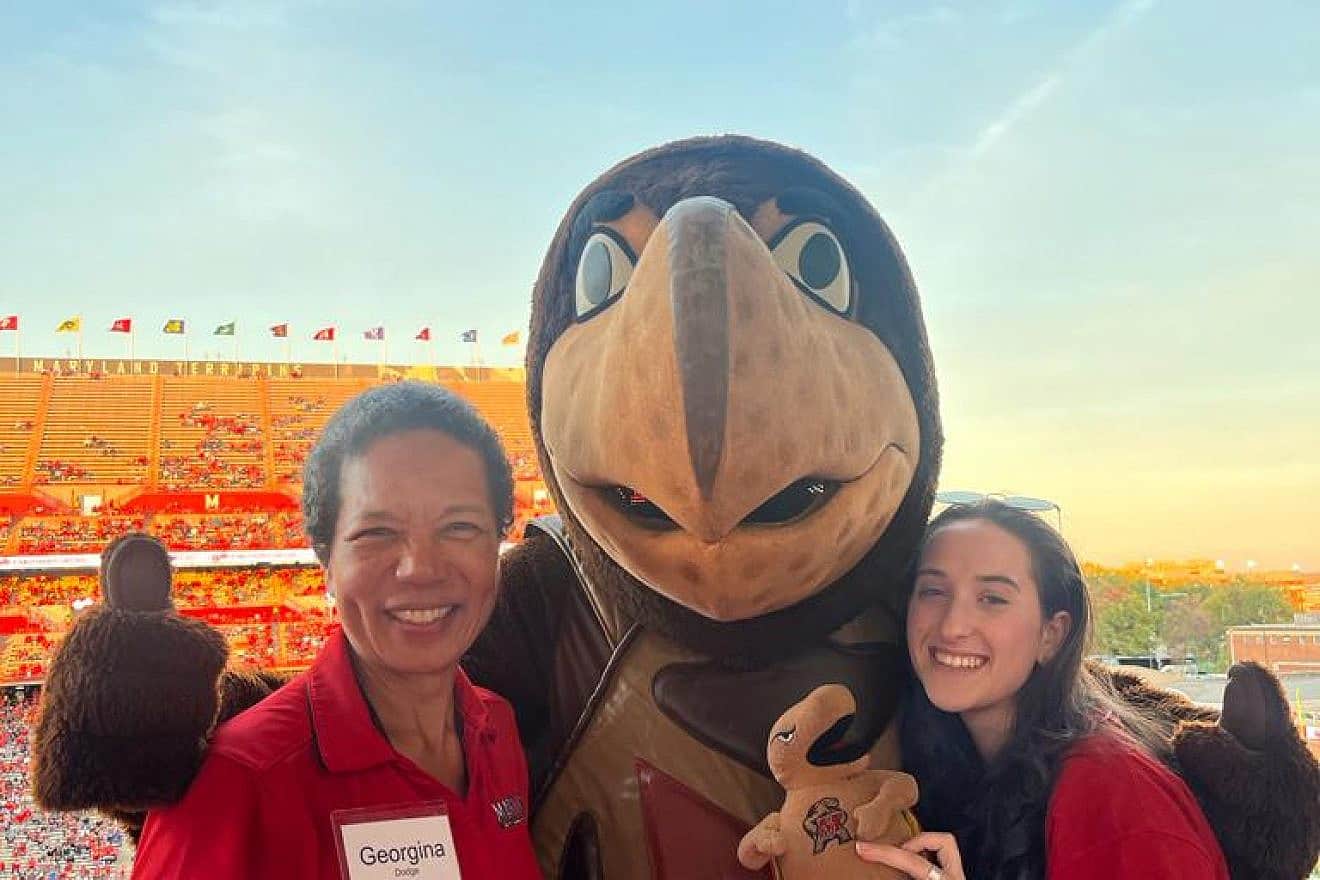
Administrators also lack specific expertise on antisemitism, students told JNS.
When asked about calls for “intifada” at SJP rallies, Patty Perillo, vice president for student affairs, told Jewish students at a Nov. 16 town hall meeting that an intifada could be peaceful. “It was clear the administration didn’t understand the extent of what that chant meant,” said Michael Lurie, a junior from New Jersey majoring in philosophy.
JNS sought comment from Perillo, who said that during the town hall, which ran for 90 minutes, a student asked why the administration didn’t think that using the word “intifada” crossed a line.
“My response was essentially the following: I understand that this word has history, and causes pain and invokes fear in Jewish people. I also want you to know that when I asked students in the Muslim Student Association about why they use this word, they informed me that for them it means peaceful coexistence,” Perillo told JNS.
“So I did not say that intifada means ‘peaceful.’ I said that for our students in MSA, it has a different meaning than it does for others,” she stated.
JNS asked Perillo what her and the university’s position was on the word, which the American Jewish Committee says “encourages targeting institutions and individuals around the world who show support for Israel, which includes the majority of Jews”; and that the Anti-Defamation League says is “a reference to violent Palestinian uprisings against Israel, specifically acts of terrorism and indiscriminate violence against civilians by terrorist groups, including suicide bombings in buses and restaurants.”
Even Merriam-Webster defines as “an armed uprising of Palestinians against Israeli occupation of the West Bank and Gaza Strip.”
Perillo did not respond by press time.
Jerushalmy told JNS that he thought better of the administration before that town hall. “It’s clear the people they brought to speak to us are diversity and inclusion experts but don’t understand how the Jewish community fit into that,” he said. “They don’t want to be seen as taking sides or being inflammatory.”
Chen respects the administration and appreciates that it has been listening to Jewish community members. But more is necessary.
“I don’t think they’ve been listening enough,” he said. “I don’t feel like the messages have been strong enough, fast enough.”


























